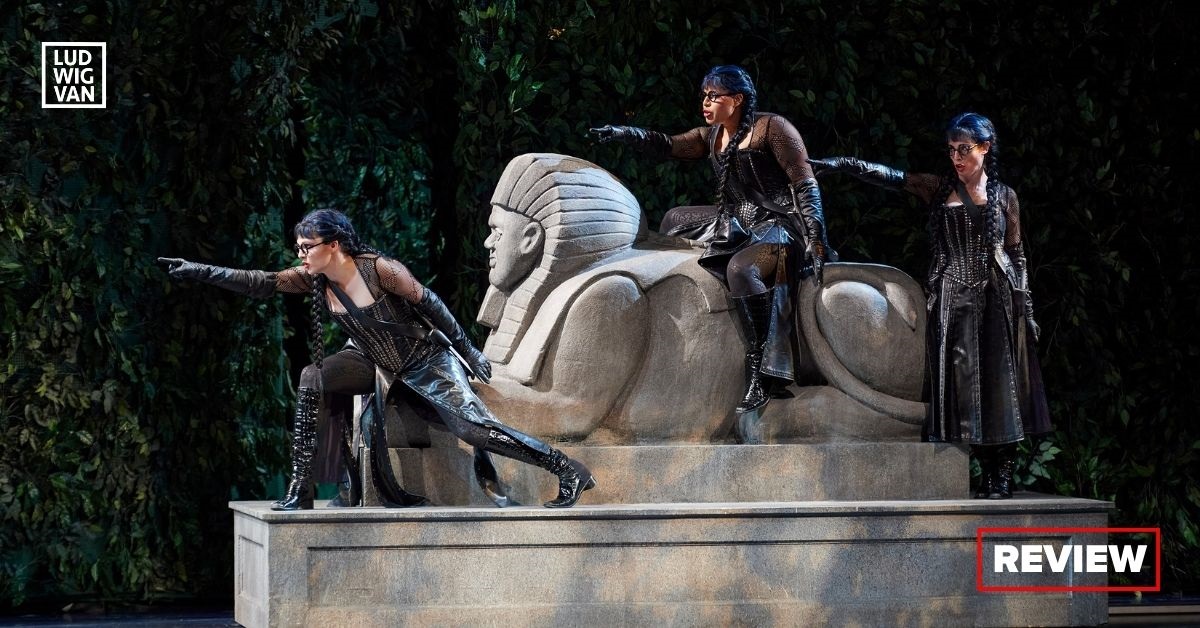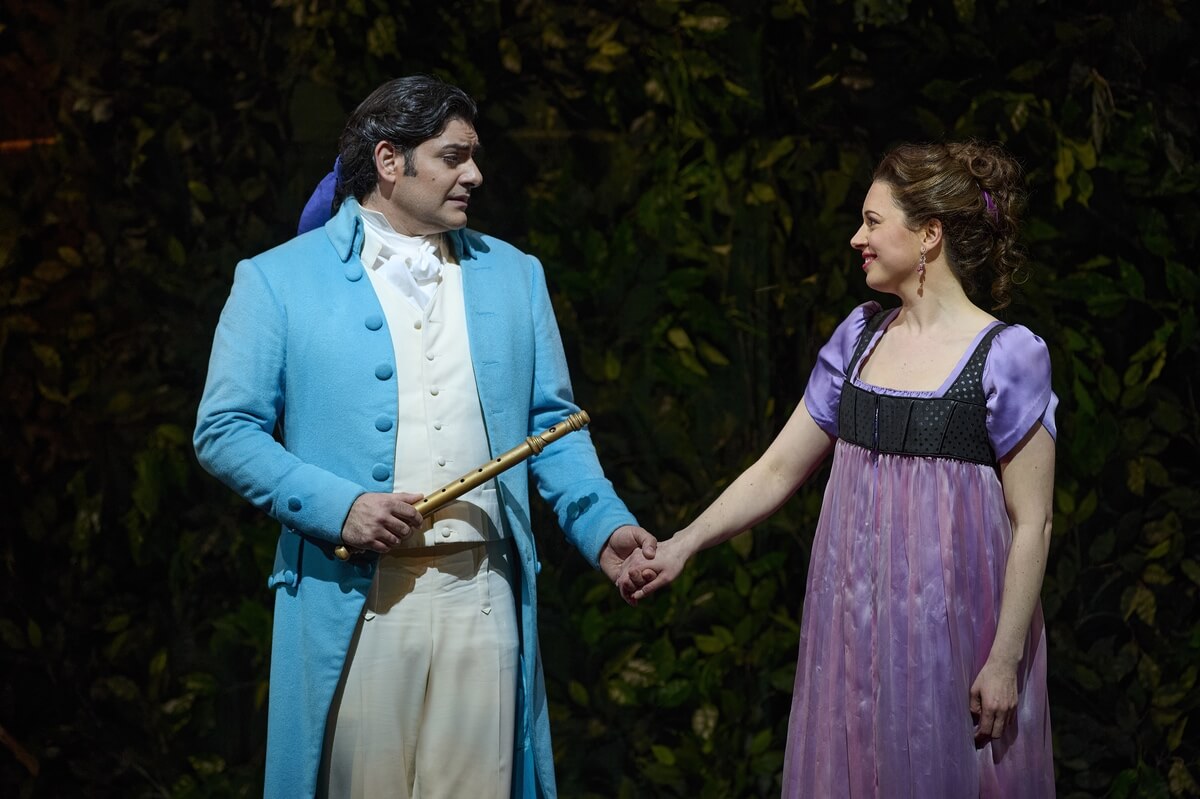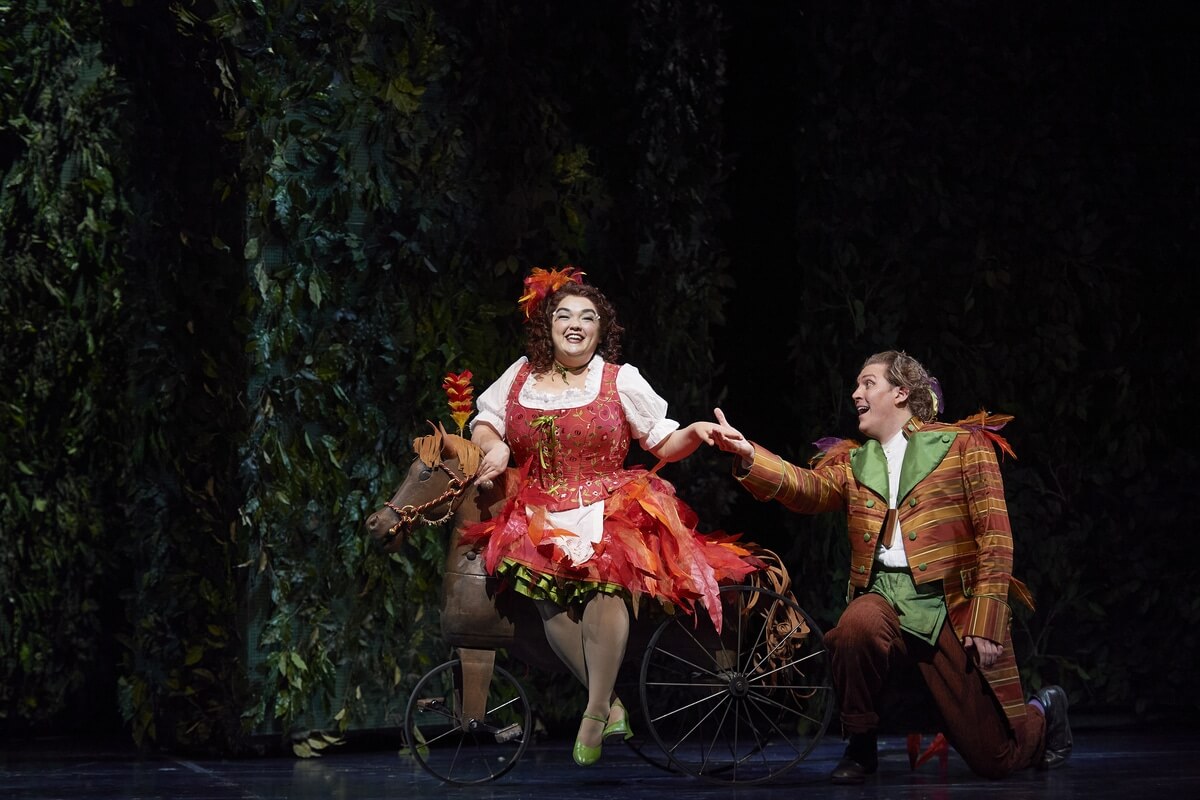
Canadian Opera Company/The Magic Flute, composed by Wolfgang Amadeus Mozart, originally directed by Diane Paulus, revival direction by Anna Theodosakis, conducted by Patrick Lange, Four Seasons Centre, May 6 to 21. Tickets available here.
American director Diane Paulus’ 2011 production of Mozart’s The Magic Flute does stand the test of time, except for a minor reservation. Overall, the Canadian Opera Company has a winner, albeit an overlong one, which it can keep trotting out every few years. The length, however, is the fault of Mozart and librettist Emanuel Schikaneder, and not the production.
What happens during the overture is an absolute delight. The scene is a nobleman’s garden in 1791 (the year the opera made its debut in Vienna) in a play-within-a-play scenario. The nobleman’s family, his guests and the performers arrive in a commotion of activity, while his domestic staff conducts a flurry of last-minute duties around the outdoor stage.
Supposedly, the event is to celebrate the name day of Pamina, who will perform the leading role. The actors are both from the family and guests, along with professionals from the theatre world, or so we gather. Tamino and the three Ladies, for example, seem to be outsiders.
In the first act, the staff (which happens to be the mostly female chorus), remains on stage to enjoy the opera along with the audience at large, clapping and reacting at will. When the actors’ cues are at hand, they leave the garden seating to go backstage and get ready to perform.
The second act is still the garden, but this time it is a maze, with hedges twisting and turning in all directions to create a confusion of performing areas. This visual turmoil reflects the angst of the trials which Tamino and Pamina are facing. At this point, we should give credit to American set and costume designer Myung Hee Cho for her vibrant visuals.
Which brings us to the minor reservation. We never get back to the people we meet in the first act.
Paulus, in her 2011 program notes, states that “fantasy and reality fade away”, as an explanation for this left turn, but whether in 2011, or the 2017 revival, or now in 2022, there is a feeling of incompleteness. Why go to all the trouble to establish the play-within-the-play scenario, if not to go back there? It is like there are two different operas going on, at least scenically, divorced one from the other.
From the very first notes of the overture, I was a happy camper. German conductor Patrick Lange showed a lightness of touch and quickness of speed that totally embodies Mozart’s score. While he does slow down for some of the more reflective arias, he never falters in treating the glorious music like Mozart intended — as a romp through a story that is both silly and philosophical at the same time.

The singing, however, is a mixed bag.
The runaway star is Quebec-born soprano Anna-Sophie Neher as Pamina. She is just in the early stages of her career, and if there is any justice in the opera world, she will rise to the top. Her voice is absolutely thrilling because it has heft and body along with its sweetness. It soars at the top, yet has a woody strength in the middle and bottom registers. Her singing captures the ear and holds it hostage.
Another hero, at least to me, is American bass David Leigh as Sarastro, whose music is my favourite in the opera. We’ve heard Leigh before in Turandot and Hadrian and his voice has become even more majestic. It is a basso profundo that is almost devoid of vibrato, so pure and stately is the sound. He can also go right down to the bottom of his toes for the low notes. I need a Sarastro with a compelling and commanding sound, and Leigh fits the bill, although, he is, admittedly, a bit of a stick as an actor, so some more expression might be in order.
Canadian bass-baritone Gordon Bintner as Papageno has an extremely pleasant voice with even delivery throughout. It is the type of singing that never jars or is harsh, which makes for easy listening. While the role of Papageno does not really allow him to pour out passion, we did hear hints, from time to time, of the power he is capable of. If there is any downside to his performance, it is the tendency to overdo the mugging.
Alas, Swiss tenor Ilker Arcayurek as Tamino has a very peculiar delivery. He sort of slides up to the high notes through a funnel, and when he gets up there, he sounds strained. It is an old-fashioned, far away sound, like listening to an ancient phonograph record. Most of his credits seem to be in oratorio and symphonic works, so maybe he sounds better on the concert stage.
Norwegian soprano Caroline Wettergreen as Queen of the Night can certainly hit the very high notes and precision coloratura that that role demands, and received big applause from the audience for her effort. That being said, it is a thin sound. Even her speaking voice is low (and in The Magic Flute, there is spoken dialogue between the singing passages.) As well, there is no thrilling or soaring nature to her sound, at least in this role. It would be interesting to hear whether her voice breaks out performing a part that is not imprisoned in the stratosphere.
Canadian tenor Michael Colvin as Monostatos certainly shows his considerable acting and singing ability to the max in this opera. Somewhere along the line, he graduated from leading man to character tenor, and as a result, has created a healthy international career for himself. Colvin never disappoints.
American-born soprano Midori Marsh as Papagena is a current member of the COC Ensemble Studio, and I have now heard her on several occasions, and the verdict is, she has the goods to go the distance. Papagena is a tiny role, but you could still hear the strength and the power that lies within. Marsh has a truly gorgeous, expressive sound and is a joy to listen to.

Canadian Baritone Russell Braun as the Speaker shows that his voice is continuing to darken and deepen from the lighter baritone he once was. He is also growing in expressive delivery. Braun has always been an elegant singer, but he is clearly in a transition stage. Where will he end up in terms of roles, I wonder? It will be interesting to see.
The Magic Flute is an opera with tons of singing roles, and happily, all these lesser vessels are able performers.
The three Ladies (soprano Jamie Groote, soprano Charlotte Siegel and mezzo-soprano Lauren Segal, Groote and Siegel being Ensemble members) are particularly accomplished, both in acting and harmonizing. They also look like they are having lots of fun. The three Spirits (Katie Lair, Samantha Weisdorf and Derin Su Firat) have a lot to do, and considering they are children, perform their roles with professional aplomb.
The Priests (tenor Asitha Tennekoon and baritone Jonah Spungin) and Armoured Men (tenor Matthew Cairns and bass-baritone Vartan Gabrielian) are mostly drawn from the ranks of the Ensemble, and are suitably sonorous. The chorus is given some judicious singing by Mozart, and separately and together (gender-wise), they show their mettle. The men, in particular, are outstanding.
All in all, this Magic Flute has a lot of entertaining features, which includes some genuine laughs. In a few more years, I’ll be ready to see it again.
#LUDWIGVAN
Get the daily arts news straight to your inbox.
Sign up for the Ludwig van Daily — classical music and opera in five minutes or less HERE.
- INTERVIEW | Actor Diego Matamoros Takes On Icon Walt Disney In Soulpepper Production Of Hnath Play - April 16, 2024
- SCRUTINY | Opera In Concert Shine A Light On Verdi’s Seldom Heard La Battaglia Di Legnano - April 9, 2024
- SCRUTINY | Lepage & Côté’s Hamlet Dazzles With Dance And Stagecraft Without Saying Anything New - April 5, 2024



